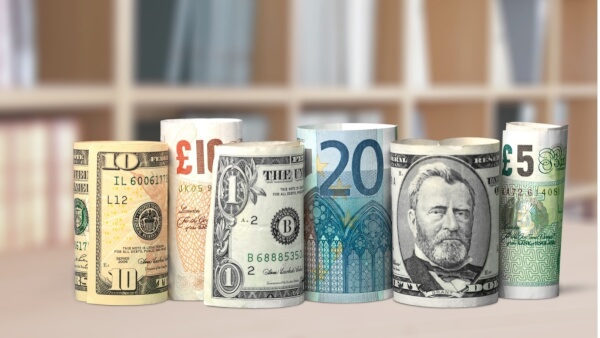Best places to exchange currency in Berlin
Your guide to best money exchange bureaus in Berlin.

Whether you’re travelling to Germany for business or pleasure, one thing’s for sure: you needn’t worry about finding an ATM.
The International Monetary Fund has estimated there are about 118 ATMs per 100,000 adults in Germany. With a population of more than 80 million people, that’s almost 100,000 ATMs across the country.
But before you rush to the first one you see, read on to find out more about using an ATM in Germany.
In Germany, ATMs are called Geldautomat. They’re normally located inside or just outside bank branches. You’ll also find them at most major airports. They’re less common in places such as shopping malls and petrol stations.
Germany’s four major banks have many ATMs, and they’ve made them easy to find with online locators:
German ATMs accept foreign bank cards, as long as they belong to a compatible card service. You can confirm whether your card will work by asking your bank back home. You should also let your bank know when you’ll be abroad. Otherwise, it might consider your German transactions suspicious and block your card.
Your card doesn’t need to be the chip-and-pin type to work in a German ATM - a standard card with a magnetic stripe works too. However, ATM keypads only have numbers, so you’ll need to know your PIN (personal identification number). German ATMs don’t accept PINs longer than four digits, either.
Most ATMs in Germany accept Cirrus, Maestro (both run by MasterCard) and Visa (Plus) cards. You can confirm if an ATM is compatible by checking whether your card network’s logo is on the machine. Alternatively, use the online Visa ATM Locator or MasterCard ATM locator to find the network ATM closest to you.
Want to exchange Euros? See how much you may save with a Wise Account:
There are three types of fees you need to consider when using a German ATM:
An ATM withdrawal often gives you the best deal on the exchange rate, because the conversion is made using the mid-market rate. This is the fairest exchange rate possible.
However, it’s best to stay alert. Some ATMs will ask if you’d like to be charged in your home currency. This is an exchange rate rip-off. Transactions in your home currency are done using something called Dynamic Currency Conversion, which essentially means the ATM will make up an exchange rate for you which is not favourable. Avoid this scam by always choosing to perform the transaction in Euros.
Germany’s major banks don’t charge ATM fees to foreigners. Privately operated ATMs, however, may charge high fees.
You can distinguish private machines from bank ATMs because they don’t have a bank’s name and branding. Instead, they’ll have names such as Cashpoint, Cashzone, Euronet or Travelex. The good news is that the machine should warn you that you’ll be charged a fee (and the amount) before you complete the transaction.
Many banks charge fees for using an ATM abroad. Fees and charges will vary from bank to bank, so it’s best to ask your bank about this. Also, you can expect to be charged a withdrawal fee and a foreign currency transaction fee.
There are various ways you can avoid ATM fees, or at least reduce them. Here are a few ideas.
German banking giant Deutsche Bank is part of the Global ATM Alliance, a partnership between several well-known banks, including Barclays and Bank of America. If you’re a customer of an alliance bank, you can use other alliance banks’ ATMs worldwide without paying a withdrawal fee.
If your bank isn’t part of the alliance, it’s still worth asking if it has a relationship with a German bank that would allow you to make withdrawals for free.
Some banks have cards that don’t incur foreign transaction fees. These include Charles Schwab in the US and Metro Bank in the UK. If you travel often, they might be worth looking into.
Credit card withdrawals are considered cash advances; and they attract expensive charges. These include a fee (3% of the amount, or even higher) and interest if you don’t make repayments on time. Whenever possible, use your debit card at ATMs.
If your bank charges a flat fee per transaction, you can reduce ATM fees considerably by making one large withdrawal instead of two smaller ones. You may need to increase your daily withdrawal limit for this to be worthwhile.
If you have a German bank account, or know someone who does, use Wise to make the transfer ahead of time and save even more to send money to Germany. Not only does Wise use the real mid-market exchange rates to convert your money (which almost always beats the banks), but since your currency is received and sent via local banking systems in both your home country and in Germany, all those nasty international fees magically disappear. Give it a try.
*Please see terms of use and product availability for your region or visit Wise fees and pricing for the most up to date pricing and fee information.
This publication is provided for general information purposes and does not constitute legal, tax or other professional advice from Wise Payments Limited or its subsidiaries and its affiliates, and it is not intended as a substitute for obtaining advice from a financial advisor or any other professional.
We make no representations, warranties or guarantees, whether expressed or implied, that the content in the publication is accurate, complete or up to date.

Your guide to best money exchange bureaus in Berlin.

Each year more than 70 million people visit Munich, making it one of Germany’s most popular cities. Within this yearly figure are over 6 million people...

Germany is a large world economy with a rich history of banking and finance. Here you’ll find a simple overview of banks, currency, and smart spending in...

With a strong economy, business investment in Germany continues to increase. Couple this with a vibrant tourist industry and Germany’s major cities - like...